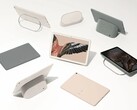1. Identical camera hardware and moderate display improvements
Camera performance is one of the reasons Google Pixel users tend to be such die-hard fans of the brand, and Google has done little to update the camera hardware in the Google Pixel 8a. Instead, Google has opted for the exact same sensors as found in the Google Pixel 7a. Now, it must be said that this isn't a terrible thing — the Google Pixel 7a is capable of some pretty impressive camera performance, especially for a mid-range smartphone. Reusing the same sensors in the Pixel 7a and 8a simply makes the Google Pixel 8a a less compelling buy for those interested in photography.
It's also worth mentioning that many of Google's AI photo editing features, like Magic Eraser and Video Boost, are either cloud-based and available to all Pixel devices or are locked to the Pixel 8 Pro (curr. $969 on Amazon). What little hardware improvements there are to the Pixel 8a are minor. The display, for example, is the same size and has the same resolution, but the Pixel 8a's display refreshes at 120 Hz instead of the 90 Hz of the Pixel 7a — a much subtler difference than going from 60 Hz to 90 Hz.
The new #Pixel8a is designed to help you…
— Google (@Google) May 7, 2024
Take amazing photos
Save time
Keep info secure
Meet the latest #Pixel device, online and in-stores May 14 ↓ https://t.co/RHV4ur66ow
2. Google Tensor G3 just isn't that much faster than G2
Google's Tensor SoCs have never been about speed, and the Tensor G3 did next to nothing to change that. Comparing the Google Tensor G2 from the Pixel 7a to the newer Google Tensor G3 found in the Pixel 8a, it's plain to see that the Tensor G3 is at best 27% faster than the G2 in benchmarks, but the newer chip is only faster by about 5–7% in most scenarios. The Tensor G2 from the Pixel 7a was mostly a modest step up from the original Tensor SoC, but it made massive strides in terms of stability and general quality of life, so it was regarded as a success for Google — especially after the disaster that was the Google Pixel 6 launch.
Google's Tensor G3 has on-board AI processing, which is supposed to speed up AI tasks, but it was discovered shortly after the Pixel 8's launch that most of Google's AI features were processed in the cloud instead of on-device, making that a bit of a moot point.
3. Identical materials, controversial design
One of the best — or worst — things about the Google Pixel A series is that the phones are made out of reasonable materials. An aluminium frame, plastic back, and Gorilla Glass front make for a potent combination of premium feel and durability, and the Google Pixel 8a shares all of these qualities with its Pixel 7a counterpart. Where the two phones diverge, though, is in design.
While the materials are identical, the display of the Google Pixel 8a has dramatically rounded corners. How this design choice sits with you likely depends on what type of user you are, but it's undeniable that there are some apps that simply don't work all that well with the extreme corner radii. Either way, rounder corners are hardly something to upgrade or agonise over, but it's the biggest differentiator between the Pixel 8a and 7a in terms of physical hardware.
Pro: The Pixel 8a's software support is lightyears ahead, and it costs the same
Where the Google Pixel 8a pulls far ahead of last year's mid-ranger is software support. While Google says the Pixel 7a will receive official Android updates until May 2026 and security updates until May 2028, the Google Pixel 8a will get seven years of both OS and security updates, making it a much more viable long-term smartphone than the Pixel 7a.
Further, the Google Pixel 7a still generally retails for the same $499 it launched at, although discounts (like this $425 Pixel 7a deal on Amazon) are frequent. The Google Pixel 8a is launching at the same price, and Google is offering a $100 store credit for Pixel 8a pre-orders, which makes it all the more tantalising, despite the familiar hardware and specifications.
Ultimately, the Google Pixel 8a isn't aimed at current Pixel 7a owners — and the 7a may even be more attractive if discounted further after the 8a is officially available — but it proves to be a pretty convincing deal for owners of the Google Pixel 6a. Google's trade-in deals for the Pixel 8a seem to suggest the same, since Pixel 7a owners receive nearly the same discount — $200 for the Pixel 7a and $180 for the Pixel 6a — for their devices as Pixel 6a owners when trading them in for a new Pixel 8a.





















